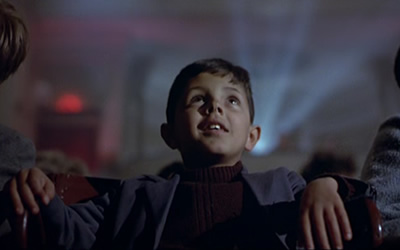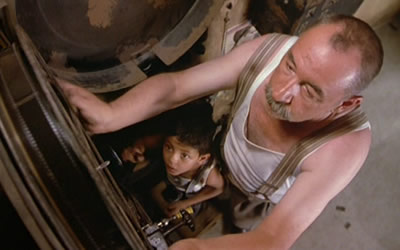
When Modern Cinema Lets You Down
Giuseppe Tornatore's "Cinema Paradiso" is quite simply a stunning movie, an Italian movie which is so well crafted that the language never poses a barrier. But its greatness is more than just its ability to communicate with those who don't speak Italian this is a movie for movie lovers with its nostalgic look at cinema from a bygone era whilst also delivering scenes of beautifully crafted cinematography. Add to that it is a love story, not just a love of cinema but also a real romance and aside that is a story of friendship and coming of age. Quite simply "Cinema Paradiso" is one of those movies where all the stars aligned to deliver something great and close to perfection.
30 years after having left his home town in Sicily, famous movie producer Salvatore 'Totò' Di Vita receives a call which not only takes him back home but also causes him to remember his time there. His trip down memory lane takes him to his childhood when he fell in love with cinema thanks to the guidance of projectionist Alfredo (Philippe Noiret - Murphy's War) who became like a father to him and through to his teenage years where he experienced both love and heartbreak as he met the beautiful Elena (Agnese Nano).

To be honest there is a hell of a lot which goes on in "Cinema Paradiso" but it is nicely separated into 3 easy sections. The first section and for me my favourite is Salvatore 'Totò' Di Vita remembering his childhood where he fell in love with cinema under the fatherly guidance of projectionist Aflredo. Now maybe it's a little too manufactured but in this first half we get immersed in the past, of the very old fashioned Italian cinema with a priest who orders certain scenes cut from the movies before the public see it to the actual Cinema Paradiso where the suits watch from the balcony, the poorer people watch from below and children sit in the front row. I say it is manufactured because everything which could go on in a cinema goes on, from people meeting their future partners, people having sex, boys pleasuring themselves whilst pranks are played and so on. But all these things are true, maybe not so true of one viewing but happened in the old days of the small cinema.
But there is more to this first half than just smelling the atmosphere of the old cinema it is about how Toto becomes like a son to Alfredo, hanging around the projection room, getting up to mischief till he eventually learns the trade. And it is so beautiful because whilst you can see this father son relationship forming, especially with Toto's own father killed at war; it makes you connect with these two people who share a love of cinema. Maybe this half, this nostalgia of a bygone era appeals more to movie lovers like myself but watching how they talk about films whilst we see how the audience react to what happens on the screen takes you to this completely different world. And in the big scene, the projection of a movie into the town square is such a beautifully magic scene, made even greater by the way young Toto's face lights up makes you wish that this went on now, the sense of community and release from watching and sharing a movie with others.
This first part ends with a powerful moment of high drama with for any movie lover or anyone who falls in love with the atmosphere in the Cinema Paradiso is heart breaking. But as the second part enters it changes emphasis as we now have Toto as a teenager and the shift turns "Cinema Paradiso" into a coming of age movie. As such whilst the nostalgic aspect is still present and we get more wonderful scenes of the cinema scene with open air screenings by the canals we get Toto meeting and falling for Elena. Basically the love of cinema now becomes a more traditional love story as Toto does what ever he needs to try and woo Elena whilst her father disapproves of his daughter seeing the projectionist. And through out this we have Alfredo offering fatherly advice to young Toto as he deals with the ups and downs of romance for the first time.
In a way this middle section borders on being the most ordinary yet the cinematography combined with Ennio Morricone's musical score lifts this romance into being something more. In fact Morricone's musical score is influential throughout "Cinema Paradiso" helping to take you off to this different place and time as if it was lifting you up on the clouds.
And then there is the final section which takes "Cinema Paradiso" full circle because we enter the movie with Toto as an adult, a famous movie producer who hasn't been home for 30 years and so we get him returning back for the first time. And basically both the first two parts coming together in this final part as his love of cinema, his bond with Alfredo, his first love of Elena and the old Cinema Paradiso combine to deliver a touching whilst also gut wrenching experience. And it is an experience which ends in a crescendo as Toto watches a movie in an old can and in doing so rediscovers his love of cinema and trust me I am not giving anything away by saying that because there is a whole lot more to it than just this.
I could go on because that is just barely scratching the surface of "Cinema Paradiso" a movie which begs to be watched not once or twice but again and again as the love of cinema bounds from the screen. And even if the love of cinema and that nostalgic glow doesn't grab you that actual romantic storyline probably will. Plus of course there is the fact that Giuseppe Tornatore crafts a movie which not only has this mass appeal for film fans but also for film makers as he delivers one stunning visual after another. A camera which slides through the bell tower and over the town square is simply captivating but then is the images of Toto as his face lights up watching both a movie and Alfredo work. "Cinema Paradiso" is such a visually strong movie that whilst it is in Italian and has subtitles you can follow what is going on by what you see and the way people act and sound rather than having to read the words.
Now whilst part of this is down to Tornatore and his brilliant direction it is also the casting especially during that first part as we meet the young and mischievous Toto. Salvatore Cascio who plays Toto as a young child has the perfect face; there is that typical mischievous school boy about it but the way he smiles and his face lights up a room as he watches a film speaks volumes of the love of cinema. It's not just that as young Cascio works so brilliantly with Philippe Noiret and that bond which forms between Toto and Alfredo is so tangible because of the connection between these two. Even Marco Leonardi who plays the teenage Toto is good as he gets across the aspects of being a teenager finding love and trouble goes hand in hand whilst still having that deep connection with Alfredo. I could go on because there is not a bad performance in the movie from Jacques Perrin who plays the adult Toto to any of the actors who play the variety of characters who visit the Cinema Paradiso.
What this all boils down to is that "Cinema Paradiso" is a great move and whilst it is entertaining it is more that just something you watch it is something which draws you in to every second be it sitting in the old crowded cinema or to those intimate moments as Alfredo advises Toto. To put it simply when you watch "Cinema Paradiso" you will want to watch it time and again.




















